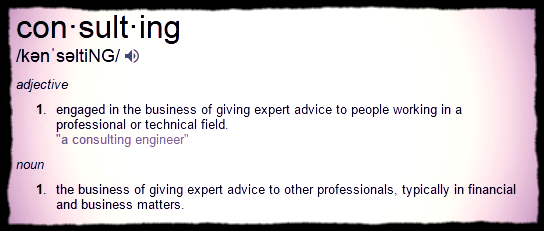You’ve probably noticed that there’s no shortage of “consulting” firms popping up lately. What is consulting, anyway? Seems like a pretty broad term, right? Well, let’s ask Google. Search “what is consulting?” on Google, and you’ll get this:
Take a look at the noun definition: “The business of giving expert advice to other professionals, typically in financial and business matters.” That narrows it down a lot, right? I didn’t think so either.
To understand consulting, you must first understand the position of the professional seeking consulting. Businesses of all sizes, from global corporations to businesses of one, seek the help of consultants to plan, strategize, and execute the business concepts that make up their day-to-day. Many companies hire financial consultants, time management specialists, team building coaches, human resources consultants, and the list goes on. This isn’t to say that the company isn’t well equipped with its own staffed professionals or that those employees aren’t doing an adequate job. Oftentimes the matters being consulted upon are just too close to the vest for these companies, and they benefit from the outside expertise, unbiased opinions and guidance offered by these consultants. Consultants are also frequently hired when a company has a big decision to make that might greatly impact their bottom line and public perception, such as an expensive marketing campaign or organizational and directional change to the company as a whole.
So now that you understand who consultants are, what they do, and why they’re hired, I bet you’re wondering what makes them so special. It’s not a fancy title, ‘consultant,’ is it? It doesn’t even necessarily allude to any specific credentials or certifications. This whole ‘expertise’ thing, maybe it’s just being thrown around, no? The general consensus is that 10,000 hours spent on one’s craft makes someone an expert, while other definitions posit that experts have sufficient experience to be able to recognize patterns in a particular field and differentiate between noise and the most rational next steps to take. In other words, experts can help businesses plan more effectively because they’re well-versed in doing so, both in the number of times they’ve applied their knowledge to execute successful plans and in the scale of the plans they’ve implemented. And, in case anyone’s still stuck on the 10,000 hours opinion, look at it this way: there are 40 hours in a typical work week. There are 52 weeks in a year. That’s 2,080 hours. I’m no math genius, but that means it takes someone roughly 5 years of doing the same thing all day, every day, to become an expert (not accounting for learning curves, individual IQ, or calendar/schedule discrepancies).
I’m sure you know several people who have been employed by your company for at least 5 years. Maybe you consider some of them experts and others, not so much. What I’m saying is this: consultants are people who have spent a significant amount of time helping lots of people do something on a larger scale than what they’re used to doing (or may be capable of doing) on their own, or with their current resources. In short, consulting makes businesses better.
While I’m making sweeping generalizations, most consultants have another thing in common. They’ve typically spent a bunch of time becoming an ‘expert’ in their field and have recognized that they hold more potential as an independent ‘expert,’ if you will, than they do as an ‘expert’ who works in a fixed role dictated by someone else. Almost any position within a company or corporation has a distinct set of parameters and responsibilities, usually with corresponding pay grades (notice I didn’t say proportional). Consultants are the type of people who have decided to embark on a different path and help as many people as they can with their knowledge, instead of helping the same group of people over and over. Therefore, consultants are typically either self-employed or work for consulting firms who pay quite nicely for their ‘experts’ to go out and consult with many businesses on a given topic or challenge.
That’s consulting in a nutshell. If you’re a business owner or someone who could benefit from a perspective rooted in knowledge but without bias to your company’s directives, finding a consultant might be a logical course of action. Consultants not only possess the expertise but the power to help execute whatever it is they advise. So, if you’ve been scoffing at the term ‘consultant’ for a while, remember that consultants might be people who have actually relinquished fancy titles and cushy corporate jobs in favor of making their own way by helping others. It could benefit you to know one or two of them.


+ view comments . . .